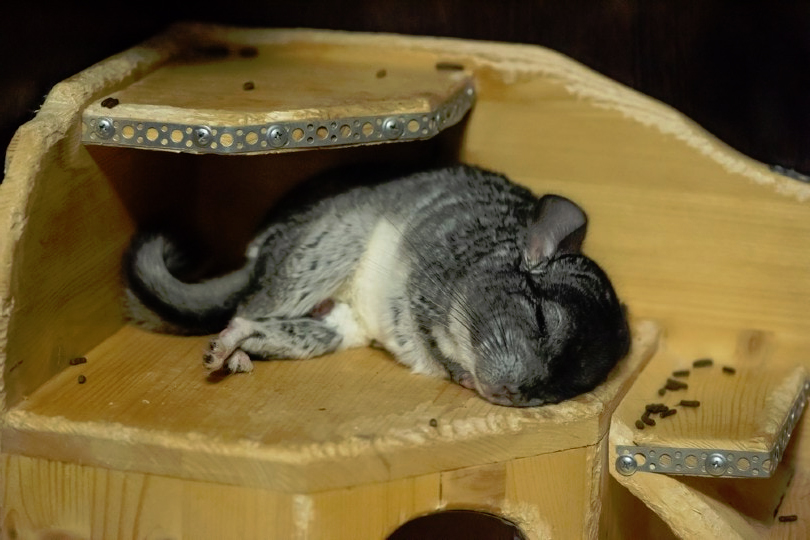Chinchillas are energetic and playful animals that require a lot of attention and care from their owners. However, sometimes they may exhibit lethargy, a condition where they become uncharacteristically sluggish, inactive, and listless. Lethargy can be a symptom of a wide range of health issues, ranging from mild to severe. As a responsible pet owner, it is essential to monitor your chinchilla’s behavior and seek medical attention if you notice any signs of lethargy.
Causes of Lethargy in Chinchillas
There are many potential causes of lethargy in chinchillas, ranging from simple issues to more severe medical conditions. Some common causes of lethargy in chinchillas include:
- Environmental Stress: Chinchillas are sensitive animals that require a calm and stress-free environment. Any sudden changes in their surroundings, such as loud noises, extreme temperatures, or overcrowding, can cause stress and lead to lethargy.
- Nutritional Deficiencies: Chinchillas require a well-balanced diet that is high in fiber and low in fat. A lack of essential nutrients can lead to lethargy and other health problems.
- Dental Issues: Chinchillas have constantly growing teeth that can cause problems if not properly maintained. Overgrown teeth or dental abscesses can cause pain and discomfort, leading to lethargy.
- Respiratory Infections: Chinchillas are susceptible to respiratory infections, which can cause lethargy, difficulty breathing, and other symptoms.
- Gastrointestinal Problems: Digestive issues, such as constipation, diarrhea, or gastrointestinal blockages, can lead to lethargy and other health problems.
Symptoms of Lethargy in Chinchillas
The symptoms of lethargy in chinchillas can vary depending on the underlying cause. However, some common signs of lethargy in chinchillas include:
- Lack of Activity: Chinchillas are typically active and playful animals. If your chinchilla is uncharacteristically inactive and lethargic, it may be a sign of a health issue.
- Loss of Appetite: A chinchilla that is lethargic may lose interest in eating, leading to weight loss and other health problems.
- Change in Behavior: A chinchilla that is lethargic may become more irritable, withdrawn, or unresponsive to human interaction.
- Respiratory Issues: If your chinchilla is exhibiting signs of respiratory distress, such as wheezing or difficulty breathing, it may be a sign of a respiratory infection.
- Dental Issues: Chinchillas with dental problems may drool, have difficulty eating, or show signs of pain.
Treatment for Lethargy in Chinchillas
The treatment for lethargy in chinchillas will depend on the underlying cause. If you notice any signs of lethargy in your chinchilla, it is essential to seek medical attention from a veterinarian who specializes in chinchilla care. They will perform a physical examination and diagnostic tests to determine the underlying cause of the lethargy.
- Environmental Stress: If your chinchilla is experiencing stress due to their environment, you should make adjustments to create a calm and stress-free space for them. Ensure that they have access to clean water, fresh hay, and a balanced diet. It is also essential to provide them with hiding places or safe spaces where they can retreat if they feel overwhelmed.
- Nutritional Deficiencies: If your chinchilla is experiencing lethargy due to nutritional deficiencies, your veterinarian may recommend changes to their diet or the addition of supplements to their food. Ensure that your chinchilla has access to fresh hay, grasses, and vegetables, and avoid feeding them high-fat or sugary foods.
- Dental Issues: Chinchillas with dental problems may require veterinary treatment to correct the issue. Your veterinarian may need to trim or file down overgrown teeth or remove any infected or abscessed teeth. They may also prescribe pain medication to help manage any discomfort.
- Respiratory infections: If your chinchilla is diagnosed with a respiratory infection, your veterinarian may prescribe antibiotics or other medications to manage the infection. They may also recommend a nebulizer or steam therapy to help your chinchilla breathe more easily.
- Gastrointestinal Problems: If your chinchilla is experiencing digestive issues, your veterinarian may recommend dietary changes or medications to manage the issue. They may also recommend fluids or hydration therapy to help your chinchilla recover.
Prevention of Lethargy in Chinchillas
Preventing lethargy in chinchillas is essential for maintaining their health and well-being. Some strategies for preventing lethargy in chinchillas include:
- Providing a Stress-Free Environment: Chinchillas require a calm and quiet environment to thrive. Ensure that their cage is located in a quiet area of your home and avoid sudden changes to their environment.
- Feeding a Well-Balanced Diet: Chinchillas require a well-balanced diet that is high in fiber and low in fat. Provide them with access to fresh hay, grasses, and vegetables, and avoid feeding them high-fat or sugary foods.
- Regular Veterinary Check-Ups: Regular check-ups with a veterinarian who specializes in chinchilla care can help identify any health issues before they become severe.
- Dental Care: Regular dental care, such as offering chew toys or dental treats, can help prevent dental issues in chinchillas.
- Proper Hygiene: Regular cleaning of your chinchilla’s cage, food dishes, and water bottles can help prevent the spread of germs and infections.
Lethargy in chinchillas is a concerning issue that can be a symptom of a wide range of health problems. As a responsible pet owner, it is essential to monitor your chinchilla’s behavior and seek veterinary attention if you notice any signs of lethargy. By providing a stress-free environment, feeding a well-balanced diet, and practicing proper hygiene, you can help prevent lethargy in your chinchilla and ensure that they lead a healthy and happy life.







